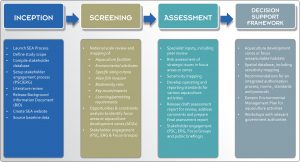Purpose of the SEA
The purpose of the SEA is to promote and support the growth of the aquaculture industry in South Africa through:
- identifying suitable areas where environmentally sustainable aquaculture development can be prioritised and incentivised; and
- providing a streamlined and integrated management and regulatory framework to reduce compliance complexities and improve decision-making processes.
Scope of the SEA
The SEA is being conducted at a national scale and includes all nine provinces. The SEA will assess the identified environmental attributes, specific siting criteria and key impacts associated with both marine (salt water) and freshwater related activities of aquaculture planning, development and operations. The assessment will consider natural (offshore, inshore and inland) and “artificial” or land-based systems operating in cold/temperate and warm waters. Candidate species that will be considered during the assessment include abalone, mussels, oysters, prawns, seaweed, tilapia, trout and marine finfish (e.g. kob and salmon). The SEA process will also review existing legislation, including licensing/permitting and authorisational procedures currently governing marine and freshwater aquaculture on a national and provincial scale.
Approach to the SEA
The approach to the SEA is underpinned by three key principles, namely:
- Saliency: It must identify and incorporate the important issues and key concerns/impacts;
- Legitimacy: It must be grounded in a transparent and participatory process and be mandated by the authorities responsible for decision-making on this topic;
- Credibility: It must be based on a recognised assessment methodology and include reputable experts and a peer review process.
The four overlapping phases and associated tasks in the SEA are shown in the figure below:
Key outputs of the SEA
The key outputs will be refined during the course of the SEA and are expected to include:
- National scale mapping of existing aquaculture facilities and of the sensitivity of the receiving environment, in order to identify proposed focus areas or aquaculture development zones;
- Risk and benefit assessment for aquaculture species/types within the focus areas/zones, that provides associated management protocols for aquaculture development; and
- Environmental compliance framework enabling a streamlined and integrated decision-making process to reduce (or limit) the need for permitting & authorisations, for example, through the application of norms, standards, reporting requirements and monitoring protocols.
Stakeholder engagement
The stakeholder engagement process includes a breadth of consultation mechanisms, from the Project Steering Committee (PSC), to the Expert Reference Group (ERG) and focus group meetings, as summarised below.
A Project Steering Committee (PSC) comprising of authorities with a legislated decision-making mandate for aquaculture development in SA has been convened. This group will act as a project management structure, ensuring that the assessment remains on scope, within timelines and budget; and to collaborate with the SEA team to ensure that the outcomes are effective in addressing the decision-making and regulatory needs identified.
PSC members include amongst other the Department of Environmental Affairs (DEA), the Department of Agriculture, Forestry and Fisheries (DAFF), the Department of Science and Technology (DST), the Department of Water and Sanitation (DWS), the Transnet National Port Authority (TNPA), and representatives from the nine Provincial Governments.
An Expert Reference Group (ERG) has also been convened. This group consists of active NGOs, the aquaculture industry associations, spheres of government i.e. from national to local representation and experts from research institutions. The ERG will verify that the process proposed at the outset has been implemented in a fair and unbiased manner in that suitably experienced experts have been involved in the process, review structures have been designed and implemented in a credible manner, and queries/comments have been adequately addressed.
Focus Group meetings are planned at centres around the country in order to engage with local stakeholders to source information, verify mapping of existing facilities and check that all relevant issues experienced by the aquaculture industry are identified.

